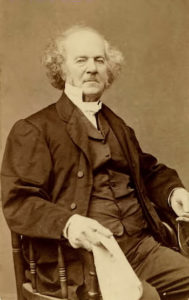
Lewis Tappan
*Lewis Tappan was born on this date in 1788. He was a white-American abolitionist.
From Northampton, MA., Lewis Tappan was the brother of Senator Benjamin Tappan and abolitionist Arthur Tappan. His middle-class parents, Benjamin Tappan and Sarah Homes Tappan, were strict Congregationalists. Once Lewis was old enough to work, he helped his father in a dry goods store. On his sixteenth birthday, he ventured into other areas of commerce and ultimately started The Mercantile Agency in 1814, the precursor to Dun & Bradstreet (D&B) and modern credit-reporting services.
He initially supported the American Colonization Society (ACS), which advocated for sending freed Blacks from the United States to Africa. Frustrated by the slow progress of the ACS, Tappan and his brother Arthur, Theodore Dwight Weld, Gerrit Smith, Amos A. Phelps, and James Gillespie Birney left the ACS. In December 1833, in Philadelphia, Lewis Tappan joined activists such as William Lloyd Garrison to form the American Anti-Slavery Society.
The departure from the ACS was due to the death of an African whom they repatriated. Captured in Africa and enslaved in Mississippi, Abdul Rahman Ibrahima Sori was a Fulani prince. The Tappans and their brother were Congregationalists and uncompromising moralists. Lewis Tappan advocated intermarriage (at the time called "amalgamation") as the long-range solution to racial issues. The Tappan brothers created chapters of the American Anti-Slavery Society (AAS) throughout New York and other sympathetic areas. He began a nationwide mailing of abolitionist material, which resulted in violent outrage in the South. In the North, the mailings generated widespread sympathy and financial support for the American Anti-Slavery Society.
By 1840, however, the anti-slavery program had expanded, and the movement splintered. After 1840, church-oriented abolitionism became the dominant movement. That year, Tappan formed the American and Foreign Anti-Slavery Society in disagreement with the AAS. The latter elected Abby Kelley, a woman, to serve on the AAS business committee. Because of his strict religious beliefs, Tappan opposed the participation of women in an official capacity in public society. Tappan founded the abolitionist Human Rights journal and a children's anti-slavery magazine, The Slave's Friend. In 1841, the Amistad case went to trial. Throughout the trials, Tappan arranged for several Yale University students to tutor the imprisoned Africans in English. The lessons included learning to read New Testament scriptures and sing Christian hymns. The Africans later drew on these skills to raise funds for their return to Africa.
After the legal victory in the U.S. Supreme Court, Tappan planned to use the Amistad Africans as the foundation for his dream to Christianize Africa. In 1846, Tappan was among the founders of the American Missionary Association (AMA), led by Congregational and Presbyterian ministers, both white and black. It linked anti-slavery activists of the East with Ohio and other Midwestern activists. In addition, it took over managing numerous disparate missions: an Oberlin, Ohio mission to the Red Lake-area Ojibwe, a mission to Jamaica, a Mende mission to the Amistad Africans, and a mission to escaped blacks living in Canada.
As the AMA grew in influence, it expanded its enterprises. Among these, it began 115 anti-slavery Congregational churches in Illinois, aided by anti-slavery ministers such as Owen Lovejoy. During and after the American Civil War, Tappan and his brother worked on behalf of freedmen in the South. Postwar efforts led to the founding of numerous schools and colleges for freedmen, historically black colleges and universities (HBCUs). Unwilling to reduce his commitment to U.S. government action against slavery in the southern states, Tappan and other radical political abolitionists denounced the Democratic Party as essentially pro-slavery.
Though mistrustful of politicians, Tappan supported various anti-slavery parties that culminated in the formation of the Republican Party. In both 1860 and 1864, Tappan voted for Abraham Lincoln. Tappan supported the Emancipation Proclamation but believed that other liberties were necessary. He wrote to Charles Sumner: "When will the poor negro have his rights? I believe not until he has a musket in one hand and a ballot in the other." He died on June 21, 1873.